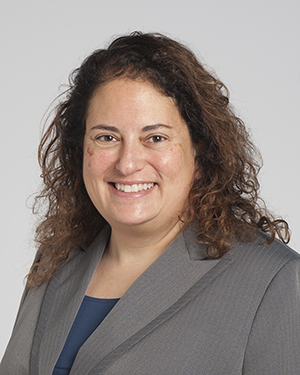Research News
12/09/2024
Cleveland Clinic shares insights from KEYNOTE-522 regimen adoption for TNBC treatment
Reporting real-world effects of the KEYNOTE-522 regimen outside of the breast cancer clinical trial helps clinicians and patients know what to expect from use of this treatment.

As one of the first institutions to report real-world experience with the new KEYNOTE-522 regimen to treat triple-negative breast cancer, Cleveland Clinic is sharing results aimed at making the treatment’s use safer and more effective.
By publishing Cleveland Clinic’s data and insights in the Annals of Surgical Oncology, Professor of Surgery, Director of the Eastern Region of Cleveland Clinic’s Breast Cancer Program and Chief of Breast Surgery at Hillcrest Hospital, Julie Lang, MD, says her research team hopes to provide other hospital systems with information they need to adopt KEYNOTE-522.
“Sometimes a treatment will act slightly differently during a clinical trial than it does in the real world,” explains Dr. Lang, who also runs a laboratory in the Department of Cancer Biology. “As one of the first institutes to report our experience with KEYNOTE-522 after the clinical trial, we have a responsibility to share our real-world findings so that treating physicians and patients understand what to expect from this regimen. Our publication helps breast surgical oncologists and their patients with triple-negative breast cancer with surgical treatment planning by analyzing factors relevant to the surgical care of these patients.”
What is the KEYNOTE-522 regimen?
Triple-negative breast cancer is known to have poor prognosis and high rates of recurrence. KEYNOTE-522 is a new triple-negative breast cancer treatment that combines regular chemotherapy with immunotherapy treatments, prior to tumor removal surgery.
“This regimen causes the cancer cells in the breast to completely respond in many patients with triple negative breast cancer. We suddenly have a regimen that's highly effective, and we had to adjust our approach accordingly,” Dr. Lang says. “However, the clinical trial report didn’t cover everything surgeons would want to know when determining a care plan.”
Dr. Lang and her colleagues questioned whether KEYNOTE-522 treatment influenced the type of surgical treatment their patients qualified for, a factor that wasn’t examined during initial clinical trials.
Comparing real world outcomes to the breast cancer clinical trial
Dr. Lang and her team looked back at 240 patients who received treatment for triple-negative breast cancer between 2019 and 2022 to identify differences between individuals treated with the KEYNOTE-522 regimen. Women who underwent KEYNOTE-522 had higher survival rates, which aligned with the clinical trial results.
Beyond pure survival, Dr. Lang’s team found that the KEYNOTE-522 regimen shrunk many patients’ tumors to a more manageable size that allowed more options for their care plan. The study found:
- Significantly more women qualified for breast-conserving therapy (a combination of radiation therapy and removing the tumor).
- Many who qualified for breast-conserving therapy still opted for mastectomies and reconstructive surgery.
- Significantly fewer women required lymphadenectomies.
Real world side effects of the KEYNOTE-522 regimen
Dr. Lang and her team saw higher rates of hormone-related side effects in Cleveland Clinic’s data than the clinical trial reported. Left untreated, hormone imbalances can cause problems like adrenal crises during surgery.
“At Cleveland Clinic, we continuously monitor hormone levels in our patients receiving immunotherapy treatment,” Dr. Lang explains. “It’s because we monitor hormones that we can catch potential issues for surgery and keep patients safe – but not all hospital systems keep track of these things the same way.”
Dr. Lang still wholeheartedly recommends the KEYNOTE-522 regimen to her patients but says it’s important to share these results widely for the benefit of patient care.
“It’s a good thing Cleveland Clinic was so early to adopt this treatment regimen, because we have unique care teams of oncologists, surgeons and endocrinologists working together to develop the best treatment plans possible for our patients. It was this collaboration that revealed the effects that weren’t reported in KEYNOTE-522's clinical trial, both good and bad,” she says. “We hope that our findings will help other hospitals design appropriate treatment plans for their own patients as they, too, adopt this new regimen.”
Featured Experts
News Category
Related News
Research areas
Want To Support Ground-Breaking Research at Cleveland Clinic?
Discover how you can help Cleveland Clinic save lives and continue to lead the transformation of healthcare.
Give to Cleveland Clinic